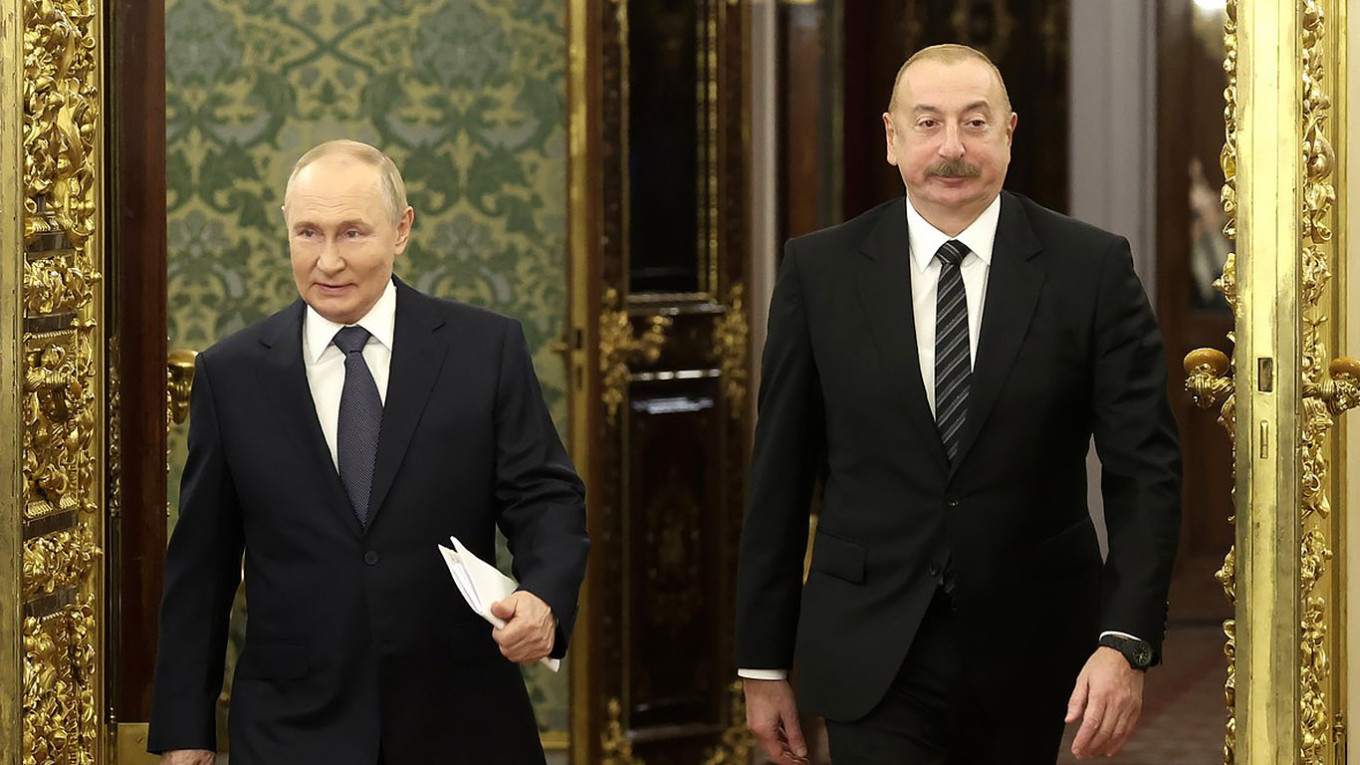
Relations between Russia and Azerbaijan, whose leaders once showcased their exceptionally friendly relationship, have been deteriorating since the Dec.
25 crash of an Azerbaijani plane headed for Russia.In the months since the deadly crash, Bakus leadership has repeatedly pressed the Kremlin to take responsibility for the incident and moved to curtail Russian soft power presence in the country.The Moscow Times has collected everything known about the rift between Moscow and Baku and asked experts to weigh in on the real reasons behind it and its possible geopolitical implications.What happened?The Azerbaijani Airlines AZAL Embraer 190 jet was en route from Baku to Chechnyas capital Grozny when it disappeared from radar near Russia's Caspian Sea coast.
It later reappeared and crashed near the Kazakh city of Aktau, killing 38 of the 67 people on board.Azerbaijans flagship carrier suspended flights to Russia following the incident and officials claimed that a Russian surface-to-air missile likely hit the aircraft as it tried to land at Grozny airport.A report released by Kazakhstan earlier this month also said that the plane was likely damaged by external objects before the crash.Russian President Vladimir Putin called his Azerbaijani counterpart Ilham Aliyev days after the tragedy, apologizing for the incident that took place while stopping short of saying Russian air defense shot the plane.Following the call, Aliyev publically demanded that Russia not only issue an apology but also admit it fired at the jet and pay compensation to Azerbaijan and the crash victims.Russia's President Vladimir Putin and Azerbaijan's President Ilham Aliyev.kremlin.ruThis month, in what seemed like a retaliatory move, Azerbaijani authorities ordered to close the local branch of Rossotrudnichestvo, a Russian state-funded cultural diplomacy agency, and downsize Russias state-backed Sputnik Azerbaijan news agency from 40 to one staff member.Azerbaijans Foreign Ministry also banned Russian lawmaker Nikolai Valuev from entering the country after he suggested that the South Caucasus country uses diaspora groups to engage in criminal activities in Russia.What is Russia saying?The Kremlin stayed short of commenting on its changing relationship with Baku except for the situation around its soft power arm, Rossotrudnichestvos Baku-based Russian House.Shortly after the news broke, Kremlin spokesman Dmitry Peskov expressed hope that the decision to close the center could be reversed."We will raise this issue with our colleagues at various levelswe do not rule out that this issue could be discussedbetween the two heads of state," Peskov told reporters on Feb.
7.Russian Foreign Ministry spokeswoman Maria Zakharova, in turn, accusedill-wishers of orchestrating an information campaign aimed at driving a wedge between the two allies a likely reference to both Azerbaijani and Russian government-linked media who have been locked in a game of trading threats and blame in the background."The depth of our interactionand wisdom of our peoples will allow us to overcome this challenge," Zakharova said at a press conference Friday.Whats next?Relations between Azerbaijan and Russia have gone through multiple crises over the years, but the most recent one is notably different due to the unusually public nature of the antagonistic discourse, said Shujaat Ahmadzada, an independent analyst focusing on the South Caucasus.If the situation continues at this pace, it is difficult to envision a clear endpoint, Ahmadzada told The Moscow Times.He added that Baku, nevertheless, has no incentive to cut off communication channels with the Kremlin a drastic move that could halt economic cooperation but also harm the millions-large Azerbaijani diaspora in Russia.Flowers in front of the Azerbaijani Embassy in Moscow in memory of the dead passengers of Azerbaijan Airlines plane.Moskva News AgencyRauf Mammadov, a senior energy manager at Fuld & Company and non-resident fellow at the Jamestown Foundation, called the current rift a temporary crisis rather than a fundamental shift in relations.The Azerbaijani leadership has repeatedly shown its ability to compartmentalize relationships with major powers whether its Russia, Iran, or the West, Mammadov told The Moscow Times.
Even when tensions flare up, Baku has a track record of managing strategic ties without fully aligning with or alienating any major player.While some commentators speculated that Russia could shut down the Baku-Novorossiysk oil pipeline in a tit-for-tat move, Mammadov notes that the pipeline carries less than 20,000 barrels of oil per day a drop in the bucket compared to Azerbaijans main export route, the Baku-Tbilisi-Ceyhan pipeline.Russia benefits from keeping the pipeline open, as it collects transit fees for the oil passing through its territory.
Shutting it down wouldnt pressure Azerbaijan, but it would mean cutting off a revenue stream for itself, said Mammadov.Further escalation could, on the other hand, put at risk the planned pipeline project that is expected to deliver 300 million cubic meters of Russian natural gas per day to Iran.Azerbaijans geographic position makes it a critical transit hub, and any disruption to regional cooperation could complicate Moscows broader economic and geopolitical goals, said Mammadov.
The Kremlin would likely think twice before allowing this crisis to spiral into something more damaging.

 20
20






